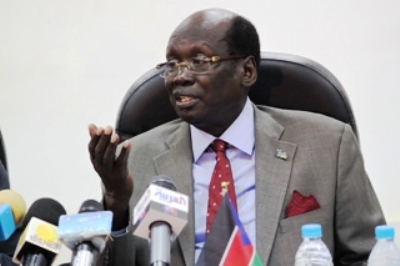South Sudan downplays warnings over disintegration
April 20, 2014 (JUBA) – South Sudan’s government on Sunday downplayed warnings that the country risks breaking down into smaller and tribally-run administrations, claiming that such utterances are meant to undermine the authority and legitimacy of its current leadership.

“But before that we will have violated not only our own constitution but the democratic principles and the best practices,” he added.
The minister denied that the new nation would disintegrate into regional and tribal conclaves, stressing that the government was doing everything within its power to exert full control and deliver services.
“Yes, there are challenges, but I think these challenges can be overcome if we work together as a country, as leaders, as brothers and sisters and as citizens of this country in putting the national agenda first before anything else,” said Marial.
Our diversity should be a source of our strength to building this nation, he added.
The top diplomat admitted that the country was undergoing a challenging period, but stressed that the situation would return to normal when peace talks are concluded.
“The government has accepted in principle to negotiate with those who have issues. These talks will resume soon and it is important the government is given a chance to try to resolve all these issues through peaceful dialogue. There is revenge to incite and revenge and then say the country will disintegrate”, he said.
The culture of war, according to the minister, has replaced the culture of the past generation, where dialogue was the preferred choice to resolve differences between rivals.
“The effect of the past war continues to denominate our thinking attitude. The culture of peace which was the preferred choice of the past generation had been replaced with the culture. The culture of today, especially among you, the young people is influenced by the thinking that the war is the best option to claim anything,” he said.
Because of this war like attitude, the politicians who have no principles at all are taking advantage to cause havoc, Marial told Sudan Tribune during the interview.
Presidential spokesperson, Ateny Wek Ateny, said the government was doing its best to bring lasting peace into the country, explaining that the army had been deployed to provide protection and safety of the United Nations and its premises as well as personnel in Bor, Jonglei state.
Mark Nyipuoc, the deputy speaker of the national assembly said he was not surprised that some people were quick to warn about disintegration of the country, instead of reaching out to their communities with a message of peace so that the government can deliver the needed services.
“Such statements do not surprise us because we have heard them before. They are part of the political attempts to undermine authority and the legitimacy of a democratically elected government. But I believe the utterance of such inflammable statement needs to be serious attention. I just don’t think we were really paying attention,” Nyipuoc said.
“There were periods when relations between communities flourished quite a bit and there were also periods of, shall I say, grayish mood between our two communities before but leaders from these communities never uttered such inflammable statements,” he added.
The officials’ reactions came in the wake of numerous public outcry regarding the attack on members of Nuer ethnic group seeking protection at the UN base in Bor.
The government denied its involvement in the attack, but a statement issued by the country’s former political detainees, claimed a group of armed police, military and wildlife soldiers in plain clothes together with some elements of Dinka Bor youth, armed with AK47 rifles and machetes attacked thousands of Nuer IDPs in Bor.
(ST)
